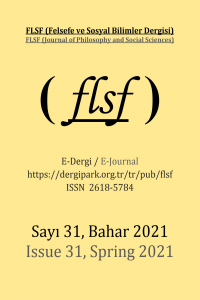IDEATIONAL DIFFERENCES ON COMPREHENSION OF LOVE: RELATION BETWEEN HUMANITY AND MORALITY IN THE DOCTRINES OF RUMI AND CONFUCIUS
Abstract
Two alternative cultures, two divergent geographies and two different eras... On one hand there is the tolerance teaching of Rumi, one of the pioneers of Islamic philosophy, that unifies the Sufi thought with the principles of the Qur'an; on the other hand, there is the wisdom doctrine of Confucius, one of the founders of Chinese philosophy, that integrates traditional rules with dogmatic items. Common point between both is the argument based on development of worldly life with a constructive moral consciousness. In this context, two philosophers aim to establish social unity and solidarity with some virtues that proceed from the foundation of love, referring to qualifying an ideal individual. However, although the comprehension of love been embarked on indicates concurrent qualities, it is etymologically and methodologically diverse. While Rumi suggests a formation of love that embraces all humanity equally, Confucius offers an approach to love that decreases in appreciation from closer to the far. This study purposes to reveal the main source of this difference.
Keywords
References
- Bayraklı, Bayraktar, Yeni Bir Anlayışın Işığında Kur’an Meali, Bayraklı Yayınları, İstanbul, 2007.
- Bodde, Derk, Dominant Ideas in the Formation of Chinese Culture, Journal of the American Oriental Society, 62/4: 293-299, Massachusetts, 1942.
- Bodde, Derk, Myths of Ancient China, Garden City Doubleday, New York, 1961.
- Can, Şefik, Divan-ı Kebir’den Seçmeler, Ötüken Yayınları, İstanbul, 2000.
- Chunqiu Zuozhuan春秋左傳, The Commercial Press International Co. Ltd., Beijing, 2007.
- Dao De Jing道德经, Zhongguo Huaqiao Chubanshe, Beijing, 2011.
- Erya爾雅, Zhongguo Shehui, Kexue Chubanshe, Beijing, 2015.
- Gölpınarlı, Abdülbaki, Mevlana, Varlık Yayınları, İstanbul, 2010.
- Kraemer, Joel L., Humanism in the Renaissance of Islam, Brill Publishers, Netherlands, 1992.
- Liji礼记, Xinjiang Qingshaonian Chubanshe, Xinjiang, 2006.
- Lunyü论语, Confucius Publishing Co. Ltd., Canada, 1999.
- Mevlana, Celaleddin Rumi, Mektubat (Mektuplar), Çeviren Abdülbaki Gölpınarlı, İnkılap ve Aka Kitapevleri, İstanbul, 1963.
- Mevlana, Celaleddin Rumi, Mecalis-i Seb’a (Yedi Meclis), Çeviren Abdülbaki Gölpınarlı, Konya Turizm Derneği Yayınları, Konya, 1965.
- Mevlana, Celaleddin Rumi, Mesnevi ve Şerhi I-VI, Çeviren Abdülbaki Gölpınarlı, İnkılap Kitapevi, İstanbul, 1985.
- Öztürk, Yaşar Nuri, Mevlana Celaleddin Rumi ve İnsan, Yeni Boyut Yayınları, İstanbul, 2000.
- Öztürk, Yaşar Nuri, Kur’an’ın Temel Kavramları I-II, Yeni Boyut Yayınları İstanbul, 2011.
- Raju, P.T. ve diğerleri, Asya Dinleri, İnkılap Yayınları, İstanbul, 2002. Sertdemir, İlknur, Mevlana ile Konfuçyüs’ün Evren ve Ahlak Görüşleri Üzerine Bir Karşılaştırma, Ankara Üniversitesi SBE, (Yayınlanmamış Yüksek Lisans Tezi), Ankara, 2012.
- Shujing书经, Zhongyang Tushuguan, Taipei, 1991.
- Shuowen Jiezi說文解字, Zhonghua ShujuYouxian Gongsi, Beijing, 2011.
- Zhong Yong 中庸, Sishu Duben, Sanmin Shuju, Taipei, 2003.
Abstract
İki değişik kültür, iki ayrı coğrafya ve iki farklı çağ... Bir yanda İslam felsefesinin öncülerinden Mevlana’nın tasavvuf düşüncesini Kur’an ilkeleriyle harmanlayan öğretisi; diğer yanda Çin felsefesinin kurucularından Konfuçyüs’ün geleneksel kuralları dogmatik öğelerle bütünleştiren bilgelik öğretisi. Aralarındaki müşterek nokta ise, müspet bir ahlak bilinciyle dünyevi hayatın şekillenmesine dayanan görüştür. Bu bağlamda ideal bir birey vasıflandırmasından bahseden iki düşünür, sevgi temelinden ilerleyen bazı erdemlerle toplumsal birlik ve beraberlik kurmayı hedefler. Ancak benimsenen sevgi anlayışı birbiriyle örtüşen nitelikler göstermesine rağmen etimolojik ve metodolojik açıdan muhteliftir. Mevlana, tüm insanlığı eşit derecede kucaklayan bir sevgi oluşumu savunurken Konfuçyüs, yakından uzağa gidildikçe kıymetlendirmede azalan bir sevgi yaklaşımı sunar. Bu çalışma, söz konusu farklılığın temel kaynağını ortaya koymayı amaçlamaktadır.
Keywords
References
- Bayraklı, Bayraktar, Yeni Bir Anlayışın Işığında Kur’an Meali, Bayraklı Yayınları, İstanbul, 2007.
- Bodde, Derk, Dominant Ideas in the Formation of Chinese Culture, Journal of the American Oriental Society, 62/4: 293-299, Massachusetts, 1942.
- Bodde, Derk, Myths of Ancient China, Garden City Doubleday, New York, 1961.
- Can, Şefik, Divan-ı Kebir’den Seçmeler, Ötüken Yayınları, İstanbul, 2000.
- Chunqiu Zuozhuan春秋左傳, The Commercial Press International Co. Ltd., Beijing, 2007.
- Dao De Jing道德经, Zhongguo Huaqiao Chubanshe, Beijing, 2011.
- Erya爾雅, Zhongguo Shehui, Kexue Chubanshe, Beijing, 2015.
- Gölpınarlı, Abdülbaki, Mevlana, Varlık Yayınları, İstanbul, 2010.
- Kraemer, Joel L., Humanism in the Renaissance of Islam, Brill Publishers, Netherlands, 1992.
- Liji礼记, Xinjiang Qingshaonian Chubanshe, Xinjiang, 2006.
- Lunyü论语, Confucius Publishing Co. Ltd., Canada, 1999.
- Mevlana, Celaleddin Rumi, Mektubat (Mektuplar), Çeviren Abdülbaki Gölpınarlı, İnkılap ve Aka Kitapevleri, İstanbul, 1963.
- Mevlana, Celaleddin Rumi, Mecalis-i Seb’a (Yedi Meclis), Çeviren Abdülbaki Gölpınarlı, Konya Turizm Derneği Yayınları, Konya, 1965.
- Mevlana, Celaleddin Rumi, Mesnevi ve Şerhi I-VI, Çeviren Abdülbaki Gölpınarlı, İnkılap Kitapevi, İstanbul, 1985.
- Öztürk, Yaşar Nuri, Mevlana Celaleddin Rumi ve İnsan, Yeni Boyut Yayınları, İstanbul, 2000.
- Öztürk, Yaşar Nuri, Kur’an’ın Temel Kavramları I-II, Yeni Boyut Yayınları İstanbul, 2011.
- Raju, P.T. ve diğerleri, Asya Dinleri, İnkılap Yayınları, İstanbul, 2002. Sertdemir, İlknur, Mevlana ile Konfuçyüs’ün Evren ve Ahlak Görüşleri Üzerine Bir Karşılaştırma, Ankara Üniversitesi SBE, (Yayınlanmamış Yüksek Lisans Tezi), Ankara, 2012.
- Shujing书经, Zhongyang Tushuguan, Taipei, 1991.
- Shuowen Jiezi說文解字, Zhonghua ShujuYouxian Gongsi, Beijing, 2011.
- Zhong Yong 中庸, Sishu Duben, Sanmin Shuju, Taipei, 2003.
Details
| Primary Language | Turkish |
|---|---|
| Subjects | Philosophy |
| Journal Section | Research Article |
| Authors | |
| Publication Date | May 12, 2021 |
| Submission Date | December 13, 2020 |
| Acceptance Date | April 9, 2021 |
| Published in Issue | Year 2021 Issue: 31 |
Starting from 2024, our journal will be published in 3 issues as two regular and one special issues. These issues will be published In May (regular issue), September (special issue) and December (regular issue).
Acceptance of articles for our special issue and our regular issue in December will begin on March 15.
Only articles within the scope of the file will be included in our special issue.
Thank you for your attention.


